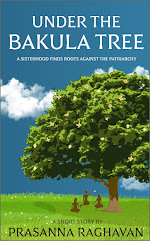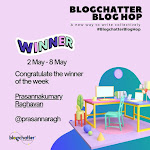Welcome to Prasanna Raghavan's Debut eBook.
Book Title: Under the Bakula Tree
Subtitle- a sisterhood finds roots against the patriarchy.
Where is the book available? Amazon Kindle and the buy link are given below.
Publishing
this book is a dream come true for me. There were times I feared my
dream would never become a reality.
Book title: Under
the Bakula Tree.
Subtitle: The
Sisterhood roots against the patriarchy.
Book Description:
Then something happens. A sisterhood turns a corner, ready to take
up her challenge. They meet under an old Bakula tree, where Sara
gets the secrets to find love again.
The story, Under the Bakula-Tree, is about the sisterhood taking root against patriarchy. It explores the female's struggles to break away from the shackles of genderism and patriarchy in a materially rich, male-dominated part of the world.
My gratitude.
I am indebted to many people for this small accomplishment: C.K Raghavan, my husband; Priya and Prabha, our daughters; Ziv and Mo(hammed), our sons-in-law; Members of our extended families and friends. Jo-Anne Richards, Richard Banyan, and Trish are the facilitators of All About Writing, the creative writing course I pursued. The course helped me find guidance in story writing techniques. Dhivya Balaji, my editor and Raeesa Rafino, who designed the book cover.
My Passion
Writing has been my passion since childhood; I wrote my first story at 7. I have no story-writing tradition to claim, but I grew up in a storytelling background. My grandmother and mother were great storytellers who played a significant role in fostering my creativity and imagination.
A big question
A big question I encounter from myself and others, directly and indirectly, is the purpose of writing.
I found some answers with a Google search: "to entertain, to inspire, to provoke what-ifs, to elicit emotions, to broaden horizons, to challenge perspectives. That drive is about touching others."
I am not claiming I have achieved all those by writing this story, but I attempted to challenge perspectives. You, the readers, are my judges; I hope you will let me know your verdicts.
The domestic hardships of the women in Kerala, I, not a stranger to that, is a topic very close to my heart. In this book, I am holding a mirror against the sickening encounters they face daily and posing the possibility of a sisterhood rooting against patriarchy as a way out. This is my story theme.
Take Away
If my book's theme and genre interest you, please buy a copy to support the cause. It is available across all global market sites on Amazon, including
TagsMy Author Page








0 comments
Post a Comment